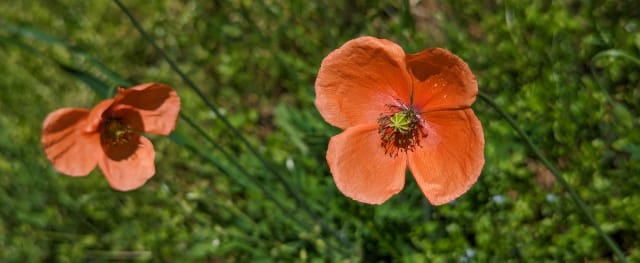No Poppy Asked for This

To you from failing hands we throw
The torch; be yours to hold it high.
If ye break faith with us who die
We shall not sleep, though poppies grow
In Flanders fields.
-- John McCrae, "In Flanders Fields"
There are corners of my garden that are kept unkempt. Deliberately so.
Surely, you may guess, and you would be right, sloth and procrastination are one side of the equation. But they are equal to, and balanced by, the sum of surprise and delight at the unexpected growth transplanted by the natural world, or perhaps in these times the pseudo-natural.
In these corners the threatened can bloom. A safe haven from marauding herds of deer, raised in near-suburban captivity, left to devour any natural thing. Pseudo or otherwise. Places where the delicious can find shelter. Where the interloper can find rest. And be left alone.
Four years ago, after forevers of null hypotheses, so long a time as to bury expectations, a single poppy grew in a corner of my garden. It came unbeckoned, sans business-card. And it bloomed, a pastel red flower.
Poppies are not common here. Even the common poppy, Papaver rhoeas. Although paper imitations are everywhere this time of year, adorning the lapels of those of a certain age, these imposters are all the evidence of poppies you will find. Drive through the countryside around us and there are no poppies in Albemarle fields. So from whence the poppy in my garden is a question without an answer.
But it does have a name, a Linnaean lineage: the “long-headed” poppy, Papaver dubium. A cousin of the common poppy. It is missing the black bulls-eye of its more famous relative, and the color of its flower is somewhere between the gaudy red of the common and the colorful orange of the more distant California poppy, Eschscholzia californica.
Over the years, after the petals have dropped, I let the long heads mature in place and release seeds like tiny salt shakers. It now grows comfortably, not commonly, both in the corners and now in raised beds that won’t need cultivation until after the shakers are empty. Nothing conjured by the Wicked Witch of the West. Not a field, exactly. But enough.
Enough to tickle memory of John McCrae’s poem. How long had it been since I’d read “In Flanders Fields”? High school? A half century past? Or more? I had no recollection, save for the poppies part. So I dug it out to read again. Sitting among my poppies.
No poppy asked for this.
No poppy represents
that the living continue war and killing
for the dead
as retribution for the death
of the dead
in war and killing.
To laud, to demand, the endless
circle of forever wars is abhorrent.
The dead are not lonely.
They do not wear watches
impatiently awaiting the arrival of
the newly slain.
They do not lose sleep over undead foes.
They cannot see the torch.
Not again.
No poppy, ever, asked for this.